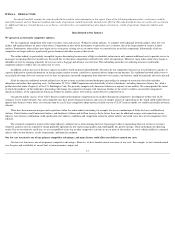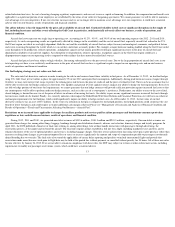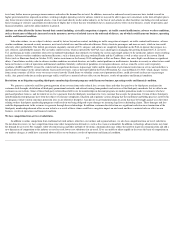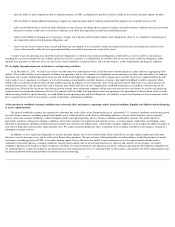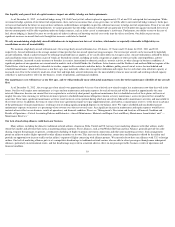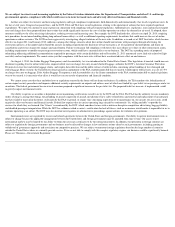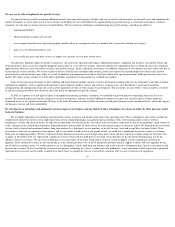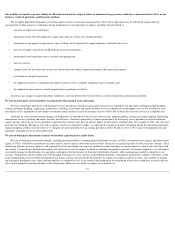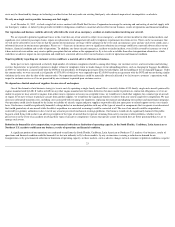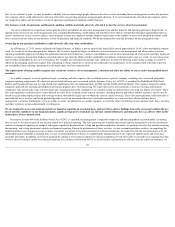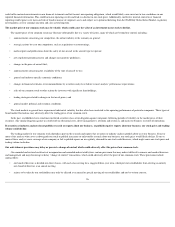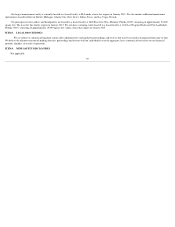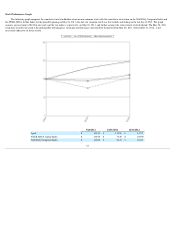Spirit Airlines 2012 Annual Report Download - page 23
Download and view the complete annual report
Please find page 23 of the 2012 Spirit Airlines annual report below. You can navigate through the pages in the report by either clicking on the pages listed below, or by using the keyword search tool below to find specific information within the annual report.
Our inability to expand or operate reliably or efficiently out of our key airports where we maintain a large presence could have a material adverse effect on our
business, results of operations and financial condition.
We are highly dependent on markets served from airports where we maintain a large presence. Our results of operations may be affected by actions taken by
governmental or other agencies or authorities having jurisdiction over our operations at airports, including, but not limited to:
In general, any changes in airport operations could have a material adverse effect on our business, results of operations and financial condition.
We rely on third-party service providers to perform functions integral to our operations.
We have entered into agreements with third-party service providers to furnish certain facilities and services required for our operations, including ground handling,
catering, passenger handling, engineering, maintenance, refueling, reservations and airport facilities as well as administrative and support services. We are likely to enter
into similar service agreements in new markets we decide to enter, and there can be no assurance that we will be able to obtain the necessary services at acceptable rates.
Although we seek to monitor the performance of third parties that provide us with our reservation system, ground handling, catering, passenger handling, engineering,
maintenance services, refueling and airport facilities, the efficiency, timeliness and quality of contract performance by third-party service providers are often beyond our
control, and any failure by our service providers to perform their contracts may have an adverse impact on our business and operations. For example, in 2008, our call center
provider went bankrupt. Though we were able to quickly switch to an alternative vendor, we experienced a significant business disruption during the transition period and a
similar disruption could occur in the future if we changed call center providers or if an existing provider ceased to be able to serve us. We expect to be dependent on such
third-party arrangements for the foreseeable future.
We rely on third-party distribution channels to distribute a portion of our airline tickets .
We rely on third-party distribution channels, including those provided by or through global distribution systems, or GDSs, conventional travel agents and online travel
agents, or OTAs, to distribute a portion of our airline tickets, and we expect in the future to rely on these channels to an increasing extent to collect ancillary revenues. These
distribution channels are more expensive and at present have less functionality in respect of ancillary revenues than those we operate ourselves, such as our call centers and
our website. Certain of these distribution channels also effectively restrict the manner in which we distribute our products generally. To remain competitive, we will need to
successfully manage our distribution costs and rights, and improve the functionality of third-party distribution channels, while maintaining an industry-competitive cost
structure. Negotiations with key GDSs and OTAs designed to manage our costs, increase our distribution flexibility, and improve functionality could be contentious, could
result in diminished or less favorable distribution of our tickets, and may not provide the functionality we require to maximize ancillary revenues. Any inability to manage
our third-party distribution costs, rights and functionality at a competitive level or any material diminishment in the distribution of our tickets could have a material adverse
effect on our competitive position and our results of operations. Moreover, our ability to compete in the markets we
22
•
increases in airport rates and charges;
• limitations on take-
off and landing slots, airport gate capacity or other use of airport facilities;
•
termination of our airport use agreements, some of which can be terminated by airport authorities with little notice to us;
•
increases in airport capacity that could facilitate increased competition;
•
international travel regulations such as customs and immigration;
•
increases in taxes;
•
changes in the law that affect the services that can be offered by airlines in particular markets and at particular airports;
•
restrictions on competitive practices;
•
the adoption of statutes or regulations that impact customer service standards, including security standards; and
• the adoption of more restrictive locally-
imposed noise regulations or curfews.


